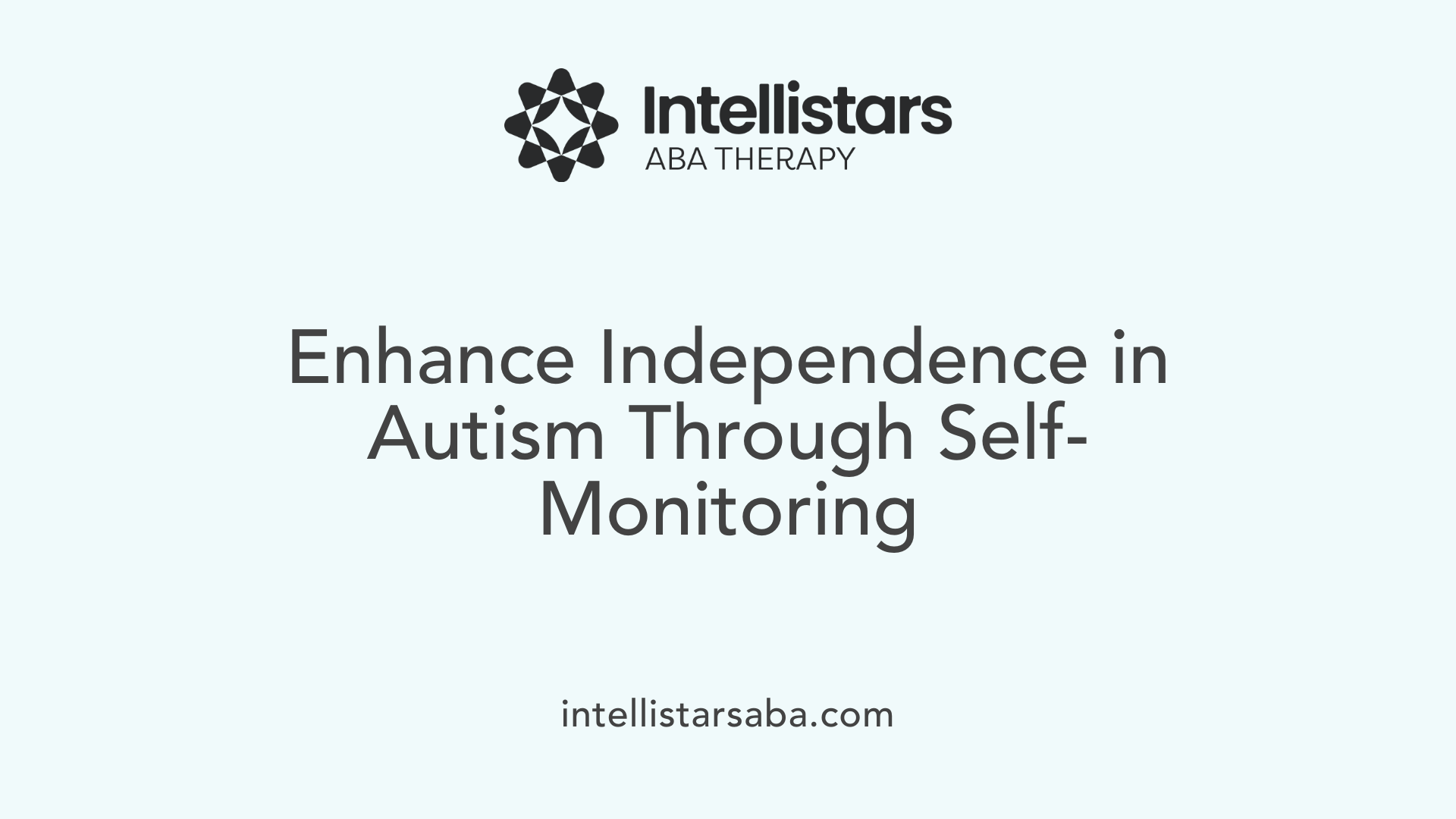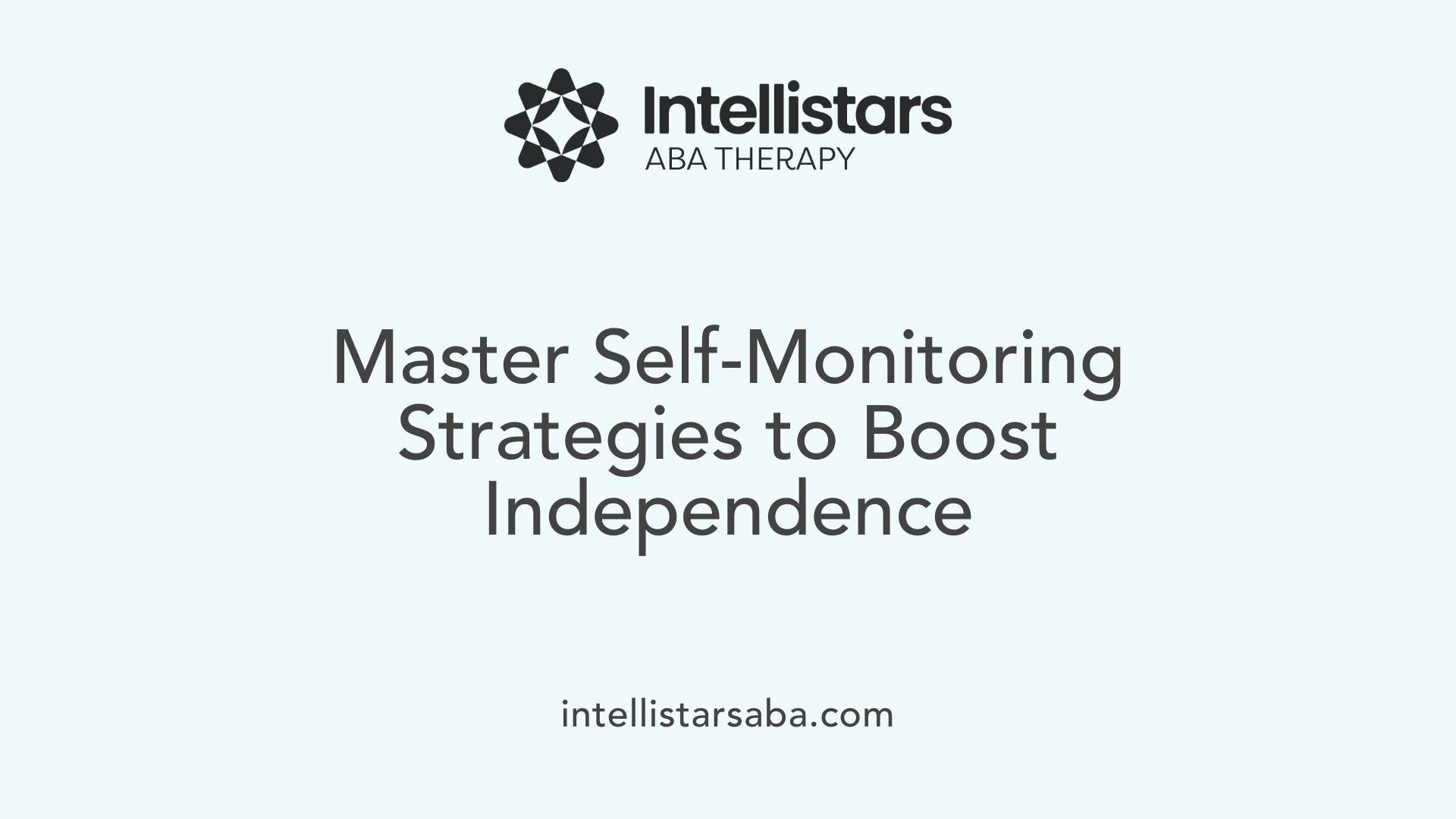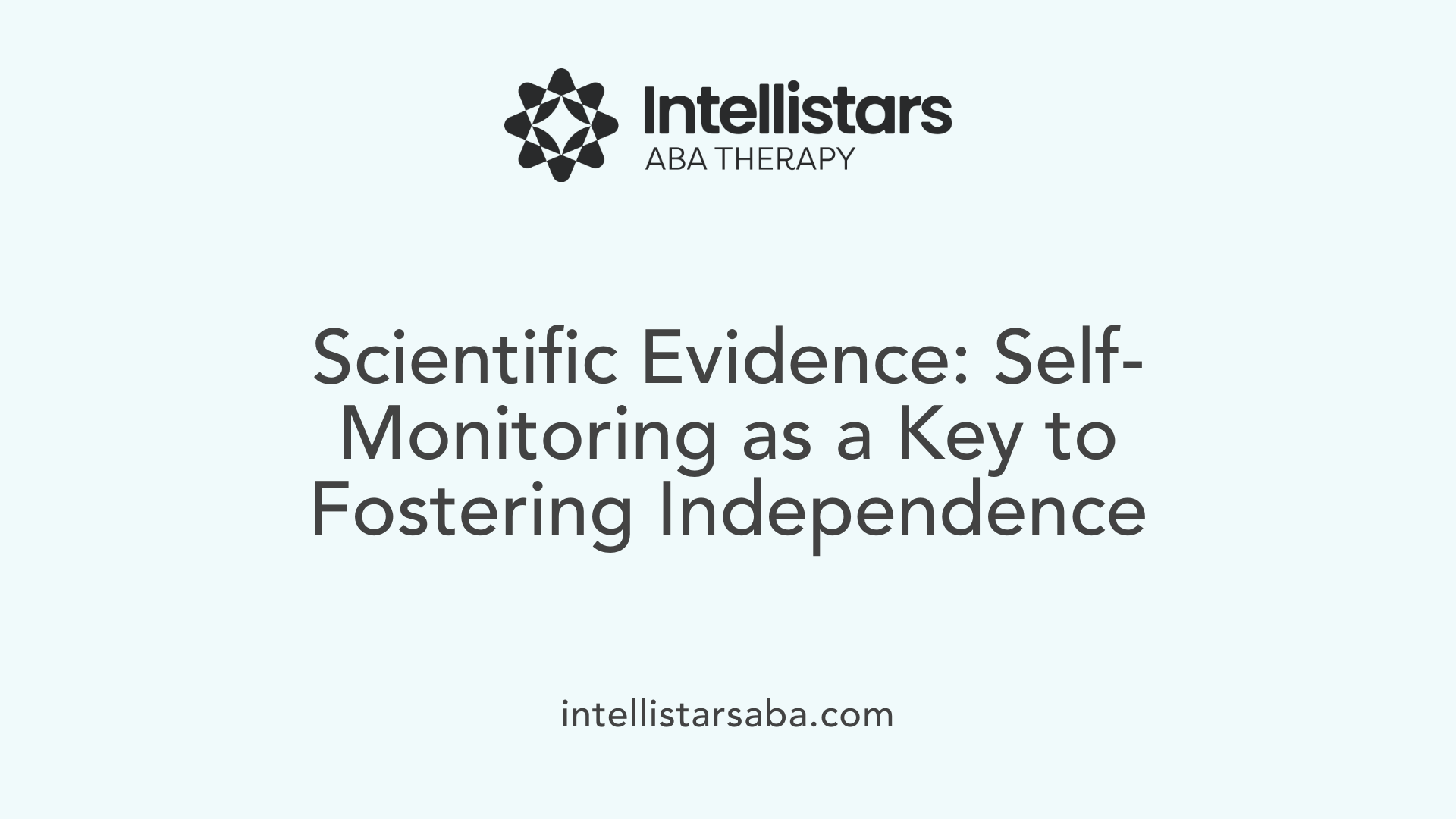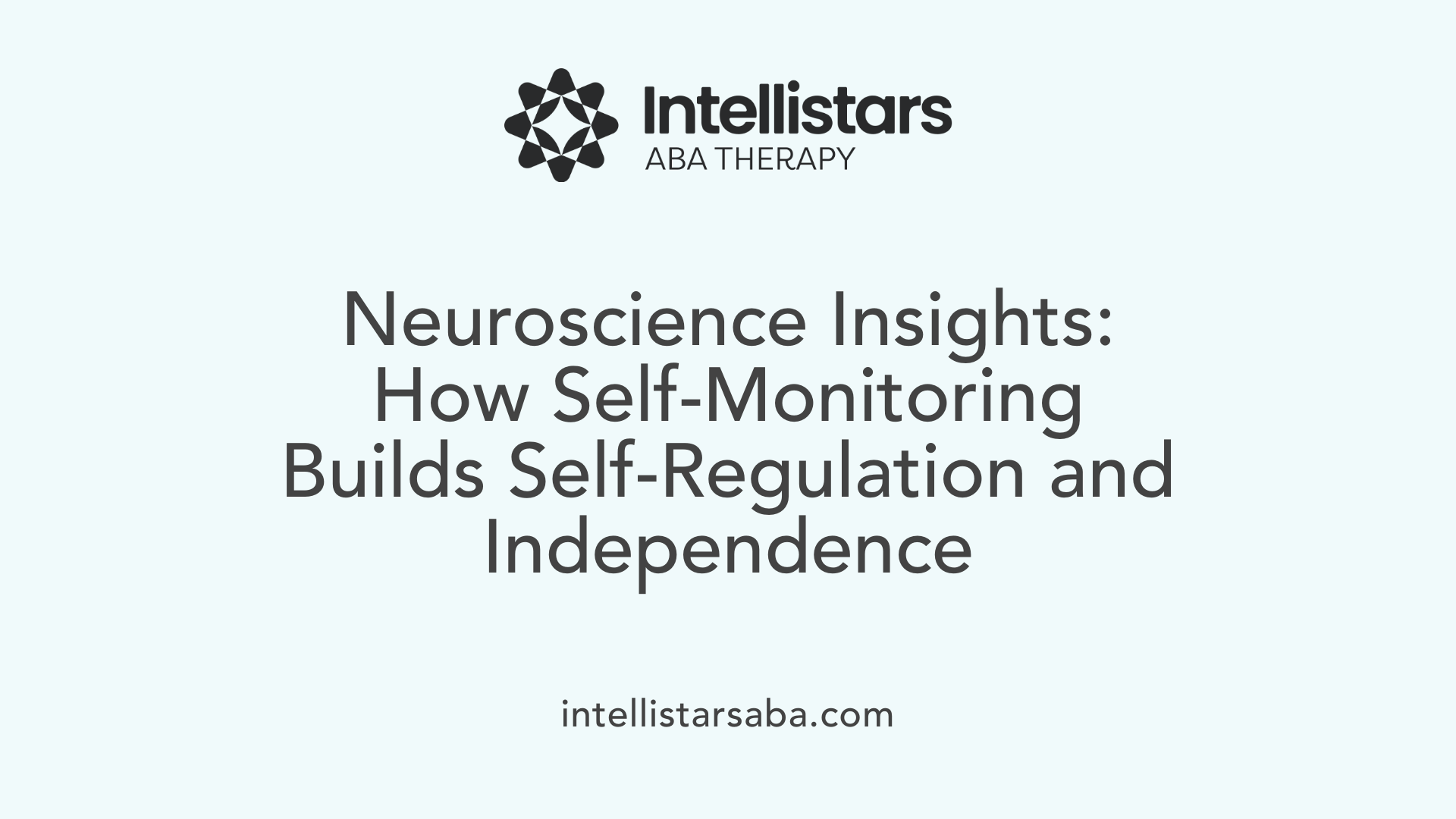Understanding the Critical Link Between Self-Monitoring and Independence
Self-monitoring is a powerful, evidence-based strategy integral to fostering independence across various populations, including individuals with autism. By cultivating self-awareness and executive functioning skills—such as planning, self-regulation, and reflection—self-monitoring enables learners to take active control over their behaviors, learning processes, and social interactions. This article explores how self-monitoring contributes significantly to independence, details effective strategies for implementation, examines research findings supporting its benefits, and offers practical tips for educators and families to foster autonomous functioning.
The Fundamental Role of Self-Monitoring in Developing Independence
What is the role of self-monitoring in developing independence?
Self-monitoring is a vital strategy that significantly contributes to building independence, especially for individuals with autism. It involves actively observing, recording, and evaluating one's own behaviors and progress, which fosters greater self-awareness. As individuals become more aware of their actions, they can better understand their strengths and areas needing improvement.
This practice enhances executive functioning skills, including planning, self-regulation, and reflection. For example, by using tools like checklists, timers, or journaling, learners learn to organize their tasks and monitor their cues for when to pause or adjust their actions. These skills are crucial in enabling individuals to manage daily challenges without constant external prompts.
Personal responsibility is another important aspect cultivated through self-monitoring. When learners set goals—such as increasing participation in class or reducing certain behaviors—they take ownership of their progress. This sense of ownership motivates continued effort and accountability, which are essential in becoming more autonomous.
Furthermore, self-monitoring supports decision-making processes. By regularly reflecting on their behaviors and emotional states, individuals learn to recognize triggers and develop strategies to manage their reactions. This ongoing self-assessment fosters autonomous decision-making, allowing learners to navigate social and academic situations independently.
Overall, self-monitoring empowers individuals to take charge of their behavior and learning. It encourages proactive engagement, self-evaluation, and accountability, which are foundational to developing independence. As they gain confidence in managing their actions, individuals become more capable of functioning autonomously in various environments, from classrooms to everyday life.
Self-Monitoring as a Catalyst for Behavior Change and Personal Growth
Why is self-monitoring important when making behavioral and personal changes?
Self-monitoring plays a vital role in initiating and maintaining behavioral and personal development. It helps individuals become more aware of their own thoughts, feelings, and actions, as well as understanding how these influence their environment. This heightened self-awareness enables people to identify patterns in their behavior and recognize triggers that lead to undesirable actions.
By actively tracking their behaviors, individuals can set realistic and achievable goals. For example, a student working on staying on task might use checklists or apps to monitor their focus during study sessions. Over time, this process allows Continuous assessment and adjustment of strategies, which are essential for sustaining progress.
Self-monitoring also enhances self-regulation—the ability to manage one's emotions and actions effectively. When individuals observe their behaviors, they can evaluate whether they are meeting their goals, and then modify their strategies accordingly. This loop of observation and adjustment increases motivation and commitment, making change more likely to stick.
Moreover, being aware of one's behaviors can improve social interactions and harmony. For instance, children who monitor their vocalizations and social responses can adapt to fit social expectations better. However, it is important to balance awareness with emotional health; excessive self-monitoring might lead to anxiety or social discomfort. Overall, self-monitoring serves as a foundation for meaningful change by fostering insight, accountability, and adaptability.
How Self-Monitoring Enhances Independence in Individuals with Autism

How does self-monitoring contribute to independence in individuals, including those with autism?
Self-monitoring plays a vital role in promoting independence, especially for individuals with autism. It allows them to observe and evaluate their own behaviors, leading to increased self-awareness and the ability to make informed decisions.
Research shows that self-management strategies, such as self-monitoring, help develop functional skills needed for daily living, social interactions, and academic tasks. When individuals learn to track their progress and recognize behaviors that need adjustment, they gain greater control over their actions.
Technological tools significantly enhance self-monitoring efforts. Devices like smartphones, tablets, and specialized applications such as I-Connect, motivate users through prompts, electronic checklists, and video recordings. For example, using video or photo prompts helps individuals understand and self-assess their behavior more effectively.
Studies with participants aged 10 to 30 years, including those with comorbid conditions like ADHD and intellectual disabilities, demonstrate improvements in on-task behavior, social skills, and problem behaviors through technology-assisted self-monitoring. These improvements translate into more autonomous functioning across different life settings.
In practical terms, self-monitoring supports skills like completing chores, managing emotions, and engaging in social interactions. Over time, these skills reduce reliance on prompts from others and foster self-directed behavior.
Overall, self-monitoring equips individuals with autism with essential self-regulation abilities. This process helps them become more independent, confident, and capable of navigating daily challenges in a variety of environments.
Strategies and Techniques for Effective Self-Monitoring

What are effective strategies and techniques for implementing self-monitoring to foster independence?
Developing self-monitoring skills is essential for increasing independence among individuals with autism. One effective approach involves teaching individuals to set clear, specific goals using simple language and visual cues. For example, writing out behavior or learning goals helps foster ownership and focus.
Using tools like checklists, timers, and tally charts allows individuals to track their behavior or progress actively. These tools serve as external supports that encourage ongoing self-assessment and help users recognize their achievements and areas needing improvement.
Incorporating visual supports is another powerful technique. Visual aids such as social stories, graphic organizers, and visual schedules make abstract concepts more concrete. For instance, visual checklists can remind students of the steps to complete a task or monitor behavior.
Reflection exercises like journaling or self-review sessions promote deeper self-awareness. Asking reflective questions such as 'What am I working on?' or 'Am I on track?' encourages children and teens to analyze their performance and emotional state, fostering self-regulation.
Building an internal dialogue or inner voice supports autonomous management of behaviors. Strategies like discussing plans, modeling self-talk, and prompting self-inquiry help individuals develop the ability to monitor and adjust their actions independently.
Consistent feedback from teachers, caregivers, or peers enhances learning and motivation. Personalized tools tailored to each individual's needs, abilities, and interests further strengthen self-monitoring capabilities.
Over time, practice, reinforcement, and gradual fading of adult guidance help individuals become more self-reliant. The ultimate goal is to support children and teens in managing their behaviors and learning activities with minimal external prompts, fostering genuine independence.
Benefits of Self-Monitoring for Executive Function and Life Skills
How does self-monitoring improve self-awareness and self-regulation?
Self-monitoring enhances self-awareness by encouraging individuals to pay close attention to their own behaviors, thoughts, and emotions. Through regular observation and reflection, individuals learn to recognize when they are on track or need to adjust their actions. Self-regulation is strengthened as they become more adept at controlling impulses, managing emotions, and maintaining focus. Tools like visual checklists, timers, and self-assessment questions serve as prompts that guide self-control during tasks, whether in academic settings or daily activities.
How does self-monitoring support goal tracking?
Setting and tracking goals is a fundamental part of self-monitoring. Writing out goals helps students clarify what they want to achieve and creates a sense of ownership over their learning and behavior. Using electronic checklists or tally charts allows individuals to monitor their progress over time. For example, a student might check off each time they successfully stay on task or complete a specific skill, providing tangible evidence of improvement. This ongoing process keeps motivation high and reinforces commitment to personal development.
What is the role of self-evaluation in developing independence?
Self-evaluation is crucial for building independence because it encourages students to assess their own performance and identify areas for improvement without constant adult oversight. Techniques like reflective journaling or asking questions like 'Am I on track?' promote critical thinking about one’s actions. As individuals become more confident in evaluating their behavior, they learn to set realistic goals and adjust their strategies accordingly. This self-assessment fosters responsibility and helps develop problem-solving skills, making students more self-reliant.
What are the overall benefits of self-monitoring in children with diverse needs?
Research shows that self-monitoring benefits students across various abilities and challenges, including those with emotional or behavioral disorders and learning difficulties. It leads to increased positive behaviors, improved academic performance, and better social interactions. By recognizing and adjusting their actions, students can reduce problematic behaviors such as stereotype or vocal outbursts and develop pro-social skills like sharing and cooperation.
Developing these skills through self-monitoring fosters lifelong independence, enhances emotional regulation, and cultivates a proactive attitude toward learning and personal growth. The process also promotes clear communication, as students become more aware of how their actions affect others, and supports ongoing self-improvement across many areas of life.
| Aspect | Benefits | Examples |
|---|---|---|
| Self-awareness | Recognizing own behaviors and emotions | Noticing when feeling frustrated and using calming strategies |
| Self-regulation | Managing impulses and emotions | Using prompts to pause and breathe during tasks |
| Goal tracking | Monitoring progress towards objectives | Checking off completed steps on a task list |
| Self-evaluation | Reflecting on performance and identifying improvements | Asking oneself 'What worked well?' after an activity |
Incorporating self-monitoring strategies into daily routines empowers individuals to take control of their learning, behaviors, and social skills, leading to greater independence and success in multiple environments.
The Scientific Evidence Supporting Self-Monitoring in Fostering Independence

What does research say about the effectiveness of self-monitoring in supporting independence?
Research highlights that self-monitoring is a powerful, evidence-based strategy for promoting independence, especially in individuals with autism spectrum disorder (ASD). Multiple studies have examined how self-monitoring can lead to positive behavioral changes and greater autonomy.
A total of 16 studies focusing on technology-supported self-monitoring interventions for individuals aged 10 and older have shown promising results. These studies often involved participants with comorbid conditions like ADHD and intellectual disabilities, emphasizing the versatility of self-monitoring across different needs.
Technological tools such as smartphone apps (e.g., I-Connect), vibrating alarms (MotivAider), iPads, and interactive whiteboards have been employed to facilitate behavior monitoring. These tools emit prompts, record behaviors via videotaping or photographing, and create electronic checklists to help individuals track their own actions.
The behavioral targets of these interventions include increasing on-task engagement, acquiring daily living skills like food preparation and cleaning, and reducing problematic behaviors such as stereotypic movements and inappropriate vocalizations. Measurements of success reveal increases in positive behaviors and skill development, along with decreases in disruptive actions.
Importantly, research indicates that self-monitoring enhances self-regulation, which is a crucial aspect of independence. It fosters self-awareness by encouraging children and teens to reflect on their own behavior, use visual supports, set goals, and practice mindful exercises like pause and breathe. These strategies help in building executive functions, including planning, self-control, and flexibility.
Studies demonstrate that when students are involved in designing their self-monitoring systems, they become more invested, which boosts efficacy. Over time, as individuals gain confidence and skills, adult supervision can be gradually reduced, further promoting independence.
Overall, the accumulated evidence confirms that self-monitoring significantly benefits behavior management, academic progress, and social-emotional development. Its consistent application across settings reinforces its credibility as a vital tool for fostering independence among individuals with diverse needs.
Connecting Self-Monitoring, Self-Regulation, and Independence through Neuroscience

What is the connection between self-monitoring, self-regulation, and independence?
Self-monitoring is a vital process that helps individuals observe and evaluate their own behaviors, thoughts, and emotions. This ongoing self-assessment fosters self-awareness, which is the foundation for effective self-regulation.
When people recognize how they are performing and what they need to adjust, they can regulate their actions more efficiently. For individuals with autism or behavioral challenges, developing self-monitoring skills promotes greater independence by reducing reliance on external prompts and support.
Neuroscientific research shows that several brain regions are involved in these processes. The medial prefrontal cortex plays a crucial role in self-reflection and understanding social cues. The amygdala is involved in emotional regulation and responding to social stimuli.
These neural structures work together to process information related to self-awareness and social behavior, guiding individuals toward appropriate actions. As neural pathways strengthen through practice, individuals gain better control over their behaviors, enhancing their independence.
Developing a strong sense of self, shaped by social interactions and internal standards, further helps in goal setting and self-evaluation. When individuals actively engage in self-monitoring, they create a feedback loop that supports the growth of self-regulation and autonomous functioning.
By understanding and nurturing these neural mechanisms, educators and caregivers can better facilitate strategies that promote self-awareness, self-control, and ultimately, independent living skills. Such interventions empower individuals to navigate social environments confidently and adaptively.
Fostering Autonomous Growth Through Self-Monitoring
In conclusion, self-monitoring is a vital component in the development of independence. Its ability to cultivate self-awareness, enhance self-regulation, and support goal-oriented behaviors makes it a cornerstone strategy in educational, clinical, and home settings. Through the integration of innovative technologies, targeted strategies, and consistent reinforcement, educators and families can empower individuals—particularly those with autism—to lead more autonomous, responsible, and fulfilling lives. As ongoing research continues to validate its effectiveness, self-monitoring remains an essential focus for fostering lifelong independence and self-directed growth.
References
- Self-Monitoring Intervention for Adolescents and Adults with Autism
- Self-Monitoring Strategies for Kids and Teens
- Using Self-Monitoring Strategies to Address Behavior and Academic ...
- Helping Children Develop Effective Self-Monitoring ... - Tera Sumpter
- [PDF] Self-Monitoring Systems to Improve Behavior Outcomes for Students ...
- The Importance Of Self-Monitoring: Why This Executive Function ...
- Increasing Independence through Self-Monitoring - ThinkPsych
- Your Guide to Implementing a Self-Monitoring System - How to ABA
- 8 Self-Monitoring Strategies For Improving Concentration & Focus






